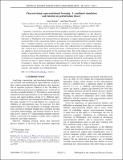Characterizing representational learning : a combined simulation and tutorial on perturbation theory
Date
28/11/2017Metadata
Show full item recordAbstract
Analyzing, constructing and translating between graphical, pictorial and mathematical representations of physics ideas and reasoning flexibly through them ("representational competence'') is a key characteristic of expertise in physics but is a challenge for learners to develop. Interactive computer simulations and University of Washington style tutorials both have affordances to support representational learning. This article describes work to characterize students' spontaneous use of representations before and after working with a combined simulation and tutorial on first-order energy corrections in the context of quantum-mechanical time-independent perturbation theory. Data were collected from two institutions using pre-, mid- and post-tests to assess short- and long-term gains. A representational competence level framework was adapted to devise level descriptors for the assessment items. The results indicate an increase in the number of representations used by students and the consistency between them following the combined simulation tutorial. The distributions of representational competence levels suggest a shift from perceptual to semantic use of representations based on their underlying meaning. In terms of activity design, this study illustrates the need to support students in making sense of the representations shown in a simulation and in learning to choose the most appropriate representation for a given task. In terms of characterizing representational abilities, this study illustrates the usefulness of a framework focusing on perceptual, syntactic and semantic use of representations.
Citation
Kohnle , A & Passante , G 2017 , ' Characterizing representational learning : a combined simulation and tutorial on perturbation theory ' , Physical Review Physics Education Research , vol. 13 , no. 2 , 020131 . https://doi.org/10.1103/PhysRevPhysEducRes.13.020131
Publication
Physical Review Physics Education Research
Status
Peer reviewed
ISSN
2469-9896Type
Journal article
Description
We thank the University of St. Andrews for funding the development of simulations.Collections
Items in the St Andrews Research Repository are protected by copyright, with all rights reserved, unless otherwise indicated.

